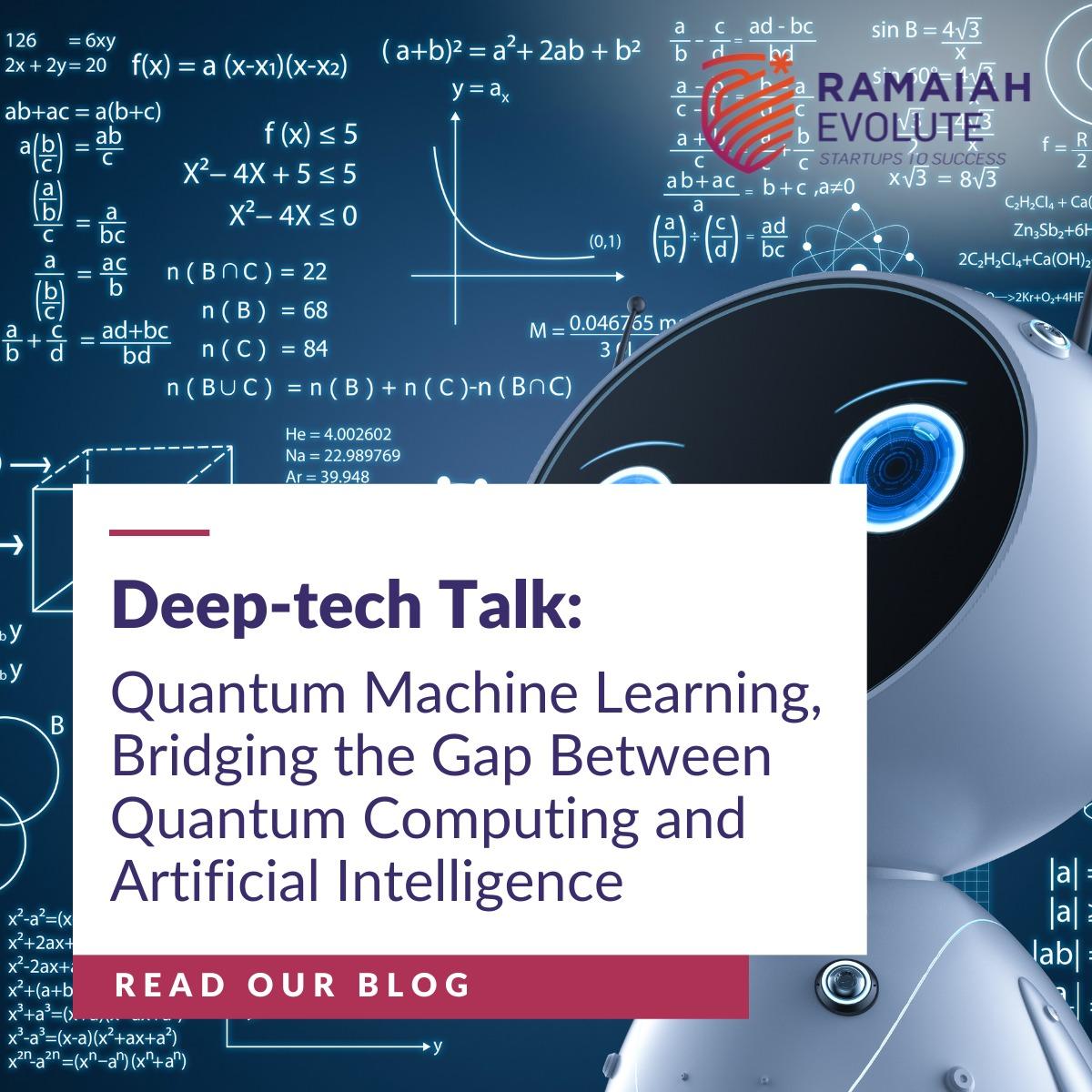Deep-tech Talk
Quantum Machine Learning, Bridging the Gap Between Quantum Computing and Artificial Intelligence

Introduction
The fields of quantum computing and artificial intelligence (AI) are on a collision course that promises to reshape industries and solve complex problems previously deemed insurmountable. Quantum machine learning (QML) stands at the intersection of these two domains, offering a glimpse into a future where quantum computers supercharge AI algorithms, enabling us to tackle challenges once thought to be beyond the reach of classical computers.
In this blog, we’ll embark on a journey to understand the essence of quantum machine learning, its potential applications, and the intriguing implications it holds for various industries.
Quantum Computing 101
Before diving into quantum machine learning, let’s briefly revisit the fundamentals of quantum computing. Classical computers use bits as the basic unit of information, where each bit can represent either a 0 or a 1. In contrast, quantum computers employ quantum bits or qubits. Unlike classical bits, qubits can exist in a superposition of states, meaning they can represent both 0 and 1 simultaneously.
This property opens up a world of possibilities. Quantum gates manipulate qubits in ways that classical logic gates can’t. For instance, quantum gates can perform operations on qubits that are entangled, a phenomenon where the state of one qubit is dependent on the state of another, even if they are separated by vast distances. This property forms the backbone of quantum computing’s power.
Quantum Machine Learning: A Fusion of Two Frontiers
Quantum machine learning is the convergence of quantum computing and AI. It leverages the unique properties of quantum computers to enhance AI algorithms. How does it work? Let’s break it down:
- Quantum Data Representation : QML can represent data in quantum states, allowing for more complex and nuanced data encoding. Quantum data representations can potentially improve the efficiency of machine learning algorithms.
- Quantum Algorithms : Quantum computers can perform certain mathematical operations significantly faster than classical computers. Quantum algorithms like Grover’s and Shor’s can accelerate search and factorization problems, respectively. These algorithms can find applications in optimization, data analysis, and cryptography.
- Quantum Neural Networks : QML also explores the concept of quantum neural networks (QNNs). These networks leverage qubits as neurons and quantum gates for processing. QNNs have the potential to model complex relationships in data more effectively than classical neural networks.
Applications of Quantum Machine Learning
The marriage of quantum computing and machine learning opens up a vast landscape of applications. Here are a few areas where QML is making strides :
- Drug Discovery: QML can analyze molecular structures and interactions at a quantum level, revolutionizing drug discovery. It can predict the behavior of molecules with unprecedented accuracy, speeding up the development of new drugs.
- Cryptography: While quantum computing poses a threat to classical encryption algorithms, QML offers the promise of quantum-safe cryptography. Post-quantum cryptography research leverages quantum-resistant algorithms to protect data.
- Supply Chain Optimization: Complex optimization problems in logistics, such as route planning and inventory management, can benefit from quantum algorithms, which can handle massive datasets and variables efficiently.
- Financial Modeling: QML can enhance risk assessment, portfolio optimization, and fraud detection in the finance industry by processing large datasets and running simulations much faster than classical computers.
- Natural Language Processing: Quantum natural language processing models could lead to more accurate language translation, sentiment analysis, and document summarization.
Challenges and Future Outlook
As promising as QML is, it’s not without its challenges. Quantum computers are still in their infancy, with practical, large-scale quantum machines remaining elusive. Hardware limitations, noise, and error rates in qubits are significant obstacles that need to be overcome for QML to reach its full potential.
The future of QML hinges on advancements in quantum hardware and the development of quantum error correction techniques. Tech giants like IBM, Google, and startups are in a race to build practical quantum computers that can handle the computational demands of QML.
Conclusion
Quantum machine learning stands at the forefront of technological innovation, offering a glimpse into a future where quantum computers redefine the boundaries of artificial intelligence. Its potential applications are vast, ranging from drug discovery and cryptography to supply chain optimization and financial modeling.
However, the path to realizing this potential is fraught with challenges, primarily centered around the development of robust quantum hardware. Nonetheless, the synergy between quantum computing and machine learning promises to revolutionize industries, solve complex problems, and usher in a new era of technological progress. As we journey deeper into the quantum realm, the future of AI is set to be nothing short of extraordinary.
SHARE

